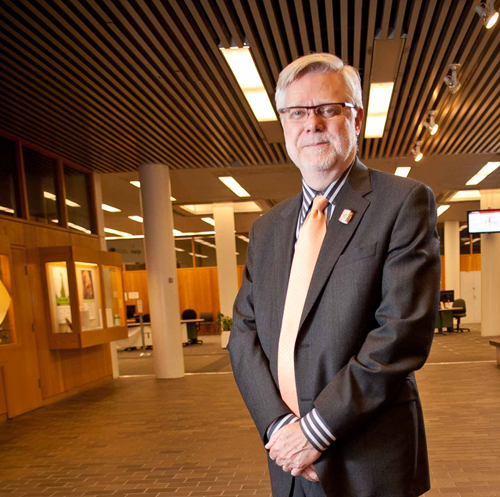
He’s on sabbatical, but former chief librarian and chief information officer Michael Ridley is still enthusiastic about sharing his ideas with U of G students and the Guelph community. He presented a session last week in the library’s Writers Workshop series about writing for the internet, using examples from his experience producing a serialized electronic book called Beyond Literacy.
Ridley’s U of G audience was more positive than the internet poster who described his online book as “bovine excrement.” In the library workshop, Ridley talked about how writers can handle less-than-flattering comments like that as well as other challenges presented by interactive writing.
He wrote Beyond Literacy last fall. Actually, Ridley would say he co-wrote it. “I wrote the central narrative and solicited others to contribute. We had a Twitter feed and encouraged people to comment. A lot of people argued with me, and those arguments are all part of the book.”
In the process – this book was done as part of a University of Toronto graduate course, with students participating as key contributors – Ridley learned a lot about what worked and what didn’t. “You don’t write the same way for the web as you do for print, and most people realize that,” he says. “What we were learning is how to write when you want to encourage others to participate.”
He adds that one of the exciting but stressful parts of this learning process was that it took place in public, without a safety net. “If we were going to fail, we’d fail with everyone watching.” The book didn’t fail but did require some adaptations. Ridley had set up the website so that people could comment and discuss individual chapters but was surprised that they didn’t get as many comments as they had hoped for.
“We found that people were more likely to comment on their own websites, or on Twitter,” he says, “so we began responding to the comments on their sites and linking back to the website. We ended up with an entire team of students working on Twitter as well.”
Wanting to have a presence on Pinterest, too, but puzzled about how to make this work on a primarily visual site, Ridley and his students eventually decided to “pin” images of the bibliography material on that site. “We had images of book covers and articles, and we found people were looking at it in a way they never look at a regular print bibliography.”
Why talk about a world “beyond literacy” at a workshop for writers? Don’t get Ridley wrong: he loves to read and loves to write. “But the alphabet is just an invention, a tool, and we can imagine a better tool. If we had something better than reading and writing, wouldn’t we jump at it?” He says we are so immersed in our literate culture that we aren’t always aware of how it shapes our brain and our understanding and experience of the world.
Still skeptical? Ridley says most of his students are, too, although he usually manages to win a few over by the end of the course. “It’s hard to imagine what a post-literate society would be like, yet we know that pre-literate societies were incredibly rich culturally and also productive, though in very different ways. Just think of aboriginal or ancient Greek cultures, for example.” In some ways, literacy is a prison, he says. It lets us do certain things better but restrains us from others.
What could be better than reading and writing? “Most writers,” Ridley points out, “have the story they are working on ‘in their heads’ and feel that it loses a lot as they write it down. So what if we were all telepathic and could convey our ideas and stories to each other in an immediate way? We would simply know each other.” Obviously, we’re not telepathic, but Ridley says there are already experiments being done in technologically-enabled telepathy. “It’s not as wacky as it seems in the beginning.”
He’s also discussing this idea and many other aspects of post-literacy in a first-year seminar course titled “Beyond Literacy: Exploring a Post Literate Future.” Ridley says he’ll teach that course again this fall and, as his sabbatical comes to a close in 2014, he’ll return to work as a librarian – a librarian with some very different ideas about books.